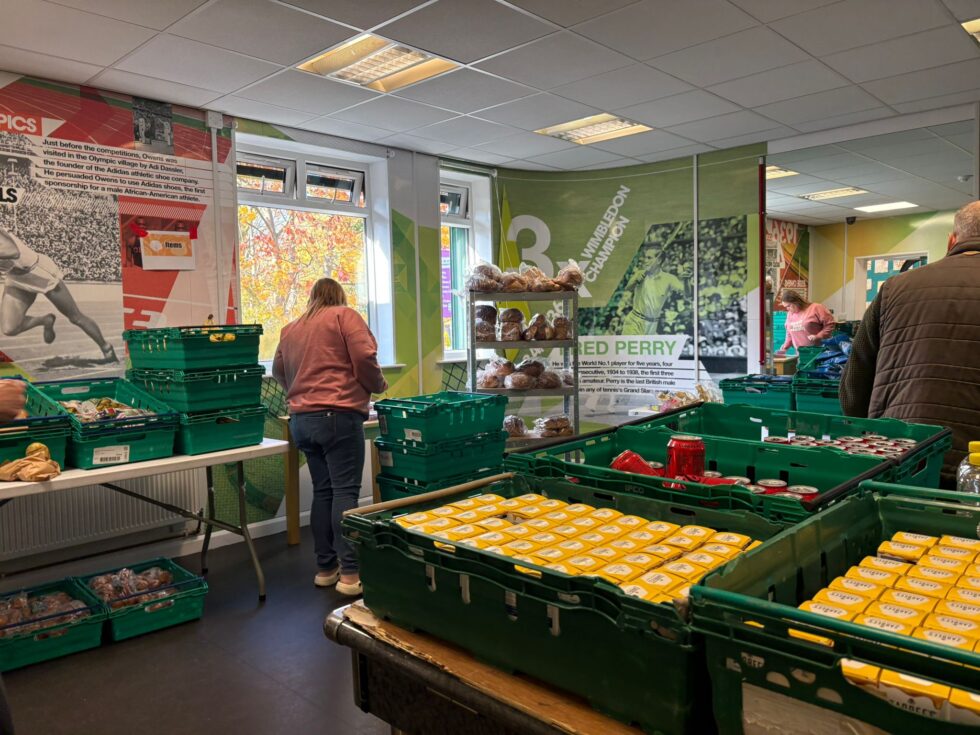Amid rising food prices and food waste, a grassroots pop-up market in Sheffield, England, offers a local solution for food waste by providing affordable groceries.
On a morning in East Sheffield, the Westfield Community Centre in Sheffield buzzes with a crowd. Inside the market, long tables are stacked with fresh produce, loaves of bread, and environmentally-friendly lunch boxes. They are surplus food that would be thrown away, but are now offered to locals at affordable prices.
Surrounded by chatter, Helen Pigott, a retired resident, smiles as she selects four bags of vegetables for just a pound.
“They’re smashing it,” she says. “I hope they keep doing it. It made such a difference to us.”
This monthly pop-up market is a collaboration between Westfield Community Centre and Food Works, a not-for-profit organisation working to build a more sustainable food system across Sheffield. It addresses two pressing issues: the rising cost of living and the environmental toll of food waste.
A food market tackling National challenges
The UK continues to face a cost-of-living crisis that began in late 2021, as inflation and energy bills surged after the pandemic and geopolitical unrest. Although the country’s economy is showing signs of recovery, financial pressure remains high for many families.
As of early 2025, the Office for National Statistics reports that 77% of adults in Great Britain are worried about the rising cost of living, with food prices being a significant concern.
At the same time, the UK has a staggering food waste problem. According to FareShare, a UK charity focused on food redistribution, over 9.5 million tonnes of food are wasted annually in the UK, much of which is still edible.
Caroline Bolton, a community development worker at Westfield Community Centre, says the idea for the market grew out of a desire to help residents feeling the squeeze.
“We want to support the needs of local people because we have pockets of poverty within Westfield,” she says.
“A lot of people don’t come into this area. They go outwards to Crystal Peaks or Moss Way, without coming to the centre. This is about bringing something back in.”

From surplus to sustenance
Founded in 2015, Food Works has become one of the UK’s most innovative surplus food initiatives.
“Our idea is to help all of Sheffield by building a hyper-local sustainable food system,” says Dan Pilles, Senior Food Supply Coordinator at Food Works.
“We want enough food to go around, nothing goes to waste and everyone’s fed and gets a fair share.”
Food Works recovers hundreds of tonnes of unused food from businesses and producers every year. This helps to reduce the environmental impact of the food system.
However, convincing food businesses to participate remains a challenge.
If you’re enjoying reading this article, why not check out this article about the young entrepreneur’s jewellery business feeding the homeless here.
“Some of the challenges we faced are convincing food businesses to work with us and supply us with their surplus food,” Dan says.
“It may be cheaper to throw it in the bin, but I have to convince them to be more ethical with your operators. If you’re not a sustainable business, in my eyes, you don’t have a future.”
Since its inception in late 2024, the pop-up market has seen increasing attendance. Residents like Helen appreciate both the affordability and the sense of community.
“I’m on a tight pension,” Helen says. “This market helps me eat well and stretch my money further. But honestly, I come for the people just as much.”
Looking ahead
The Westfield market might seem modest. But in a world where 2.5 billion tonnes of food are wasted yearly, while millions go hungry. A small-scale effort like this represents a decisive shift in thinking.
They challenge the idea that change has to come from the top. Instead, when communities work together, we should rethink how food can be valued and shared. No matter where you live, the lessons are the same: food is more than a commodity, it’s a right, a resource, and a reason to connect.
And sometimes, all it takes is a box of rescued groceries and the will to make things better.
This article has been published in Sheffield Rise in 2024.



